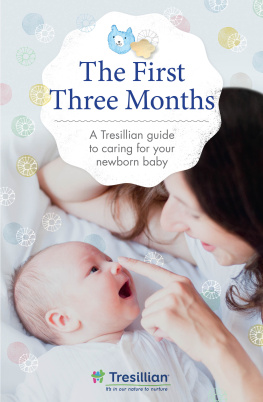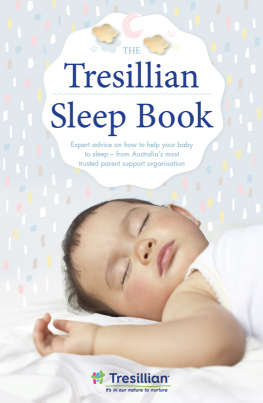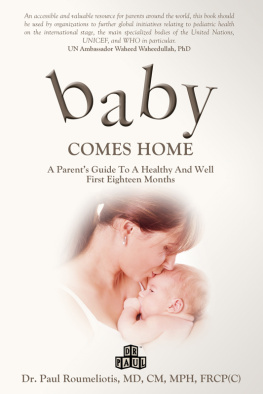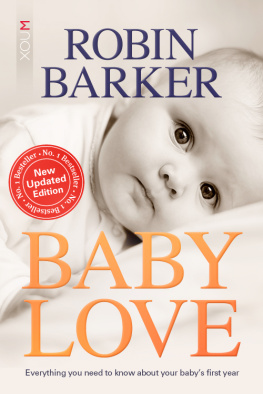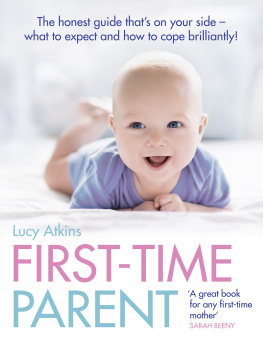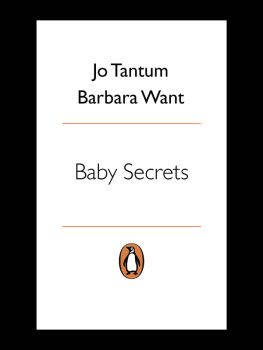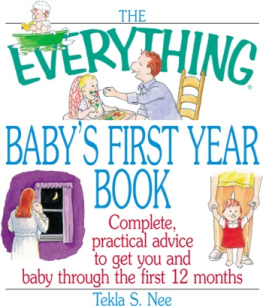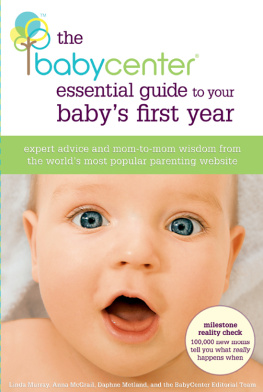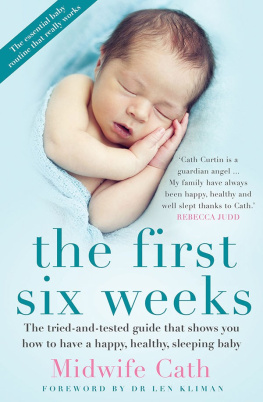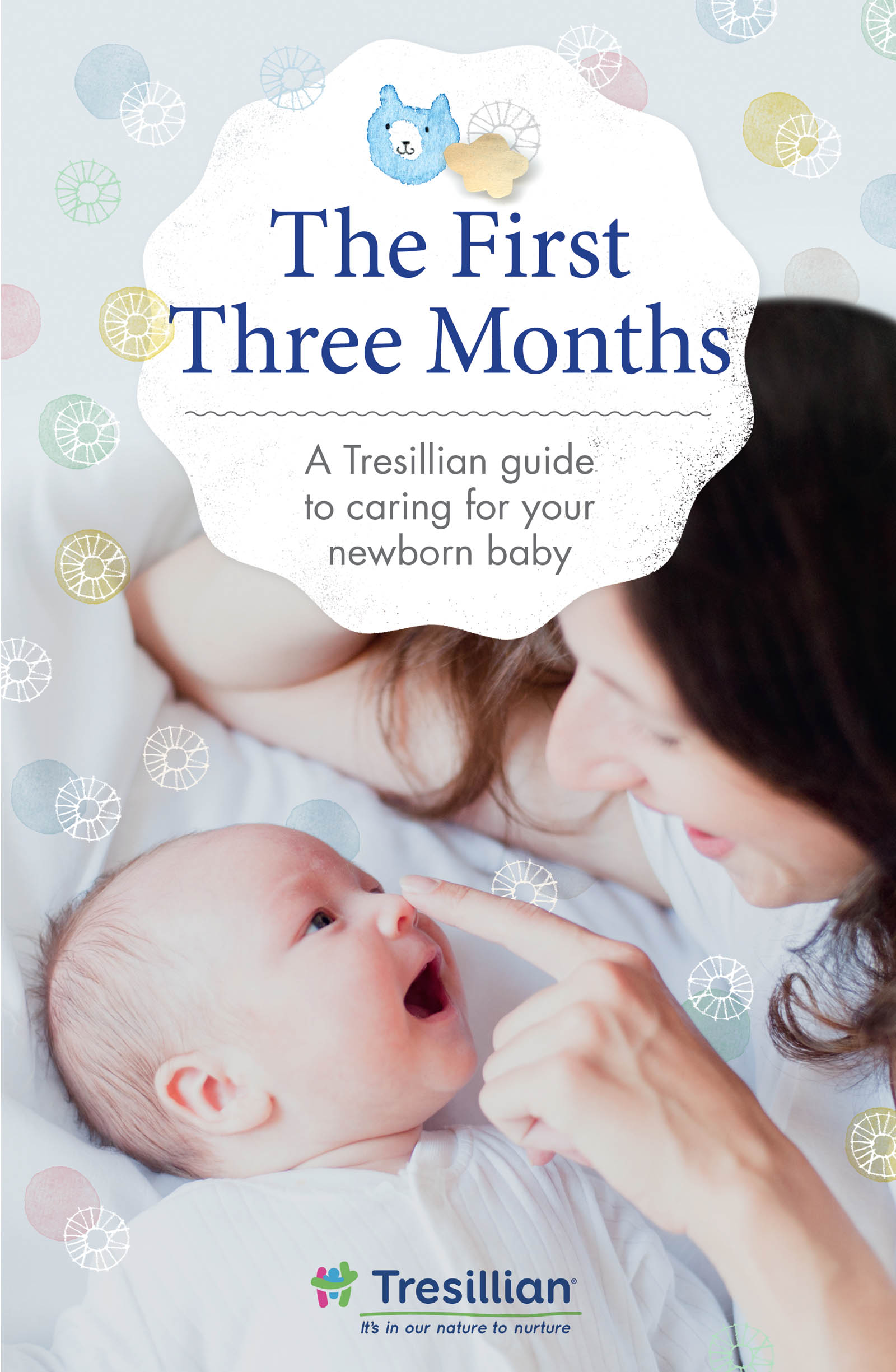Contents
Guide
Contents
I am honoured to write the foreword for The First Three Months, a comprehensive, yet not overwhelming, guide for new parents. Pregnancy, birth and becoming a new parent are times of enormous joy and happiness. Its a leap of faith into the great unknown and, as parents who have gone before you, we know that expectations dont always match reality! Too often, however, the pregnancy and parenting journey is presented using language and tone that is essentially negative, even alarmist. The beauty of this book is that its a gentle guide. Like the Tresillian nurses, this book nurtures the reader, walking alongside them and helping them to find their own pathway.
Its interesting to speculate how Tresillian has changed as have social norms and expectations of pregnancy, birth and parenting over its 100-year timespan. For mothers, the sense of responsibility to grow a new life, to be a safe vessel and present an ideal image of motherhood is probably not new. In the era of social media, however, the message is amplified and the pressure to be perfect can be overwhelming for many new mothers. Men have also arrived in the picture for the first time. When Tresillian was founded, this was a space in which men were to be seen and not heard. In fact, they were rarely even seen! Without a book like this one, my experience of my wifes pregnancy, the birth of our children and early years of their lives, was remote and detached. I went to work, because thats what fathers did. Happily, the positive role that men can play and experience, as a support for their partners and as valued parents in their own right, is now firmly entrenched and encouraged.
It may also be hard to accept that the value of parenting is also a fairly recent, and constantly evolving, phenomenon. Previously, the role of the parent was relatively passive. Children grew up in an environment separate from the world of adults and the parentchild relationship was often defined by authority. Providing for your children was about ensuring that their physical and economic needs were met. Emotional needs were secondary and developing a relationship with your child was a passive process, one that hopefully occurred but wasnt actively pursued. The most critical human relationship and the single greatest life-changing event was relegated to being just a part of life and, in my opinion, an opportunity was lost.
The message that resonates with me in The First Three Months is that parents are encouraged to find joy and wonder in pregnancy and birth, and to explore the world with their new baby. At a time in human history when we think that everything is known, this part of human experience remains an opportunity for discovery. Tresillian gives parents the permission to laugh and cry, and to feel overwhelmed and scared. Most importantly, this book reminds us that parenting matters for mothers, fathers and their child. While it acknowledges the difficult parts, it also offers reassurance, support and understanding. This is a guide, rather than a set of instructions, and the books content reflects the culture of an organisation that has nurtured women, and their families, in New South Wales (NSW) for more than 100 years.
As a father of five children, I recall reading the books of the time, seeking reassurance as the baby refused to sleep, vomited after each meal, had a fever or couldnt read Tolstoy at the age of six months! I would read and read, looking for the answer, the key that would unlock the mysteries of parenting. Dr Christopher Green, a paediatrician who had been one of my teachers, wrote Toddler Taming. Out of the pages came a message that has stayed with me: You are a good parent. You love your child. This is normal and it will be ok. At two oclock in the morning, with very little sleep, those words were important! For parents in NSW, this book, the Tresillian nurses and staff, and the whole wonderful organisation, convey this message each and every day. For that, we are grateful.
Dr Vijay Roach
Obstetrician and Gynaecologist
President of the Royal Australian and New Zealand College of Obstetricians and Gynaecologists
When you finally give birth and get to meet your new baby after nine months of pregnancy, it is a hugely exciting moment. It can also be a time filled with mixed emotions. The first few days after birth can be awesome, overwhelming and exhausting for you. You will be spending time gazing and cuddling your baby, but also trying to figure out how to feed him and change his nappies, and your body needs to recover from the birth.
If you havent given birth to your baby, but he has come to you much loved and wanted from an adoption or surrogate pregnancy, you will also experience the same emotional experiences of elation and exhaustion. You will gaze at your baby and wonder at his delights, while you struggle to figure out how to feed him, get him to sleep and readjust to a total change to your life.
If this is your first baby, then theres plenty of planning to do prior to the birth of your baby. The internet has all sorts of checklists that tell you what sort of equipment your baby might need, and how you should prepare your home and babys nursery, and it might seem a bit overwhelming.
This chapter discusses preparing for your new baby. We will cover:
- What youll need for your baby
- What youll need for yourself
- A safe sleep space for baby
- Car seats, prams, baby slings and other important equipment
- Preparing for the next stage: labour and birth
Practical items for your baby
First off, you will be bombarded by advertising about all the absolutely indispensable items youll need to care for your baby. Its tempting to be attracted by the bright and colourful gadgets available, but its usually best to stick with the basics until you get to know what you really need. If you have friends or relatives with new babies, they will be your best guide. Often, friends and family pass on clothes and other useful items. In the meantime, heres a list of ideas contributed by other mums that might help you.
New babies wee, poo and may bring up quite a lot of milk, so they tend to get messy. So your new baby will need quite a few changes of clothes at first. Opt for clothes that are easy to get on and off, such as jumpsuits and singlets. These clothes need to be easy to wash and dry. You may even benefit from some soft cloths or bibs to catch the milk spills.
At birth, hell probably need size 0000 baby clothes, but if you have a very small baby, you may wish to invest in at least one 00000, just in case. Its also a good idea to start off with some larger sizes to save money, because your baby will grow quickly!
If you have no objection to second-hand clothes, friends or family frequently offer to give or lend newborn clothes, because they wear their small sizes for such a short time. If they are clean and not too well-worn, this can be a good money-saving idea.
If your baby is born in winter, you may want to purchase two or three cardigans and two cotton hats without strings or bows. Its important for your baby to wear a cap in winter to keep his head warm. Because his head is quite large compared to the rest of his body, he loses a lot of heat through his head. Caps are a good way to keep him warm, especially when youre out and about.
Your baby will need about 68 nappies a day new babies can get very messy. If you are going to try reusable cloth nappies, you will need about 1824, depending on how often you wash them. Its usually best to have a three-day supply in case of rain. Cloth nappies are best soaked and washed every day to second day; the nappies have waterproof outer layers and soft reusable inserts that are laundered.

